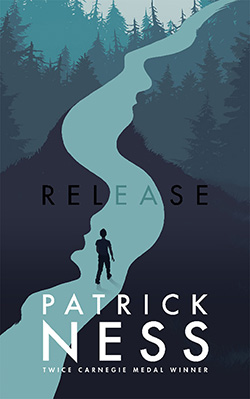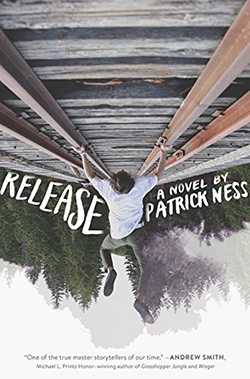Happy as I hope we all are, on the whole, I expect each and every one of us has lived through a few bad days too.
Now I don’t mean those days when we have to deal with death or ill health or anything actively awful. I’m talking about those days that just suck a bunch; those days when nothing seems to go your way. Maybe it starts with a letter from the taxman and spirals up, up and away from there. Maybe the milk is spoiled so you can’t have your morning coffee. Maybe traffic makes you late for work even though you left early. Whatever the particulars, these are the days when everything that can go wrong does go wrong, and damn your plans.
These days don’t destroy us, because we’re reasonably well adjusted human beings. Tomorrow’s another day, we tell ourselves. It’s not like the world is ending or anything. But it is in Patrick Ness’ ninth novel. Like The Rest of Us Just Live Here and More Than This before it, Release is a smart and sensitive standalone story that mixes the mundane with the magical in order to underscore the extraordinary qualities of the ordinary. It’s a brief book about a bad day as bold and as beautiful as any finely-honed tome about the rise of Rome.
The bad day I’ve been banging on about is had herein by a young man called Adam Thorn. Adam is a pretty typical kid. He’s never done drugs or caught an STD or seen a psychiatrist or displeased the police. He probably did decently at school, and he’s definitely been holding down an alright job at a warehouse run by an Evil International Mega-Conglomerate in the several years since. He doesn’t deserve to be miserable, but he is—in large part because of his family.
They fuck us up, our families! They don’t mean to, but they do, and Adam’s family is no exception to that regrettable rule. His father’s a pastor at The House Upon the Rock, his mother is Big Brian Thorn’s number one one fan, and his older brother Marty does God’s Work as well. Naturally, none of these things should stop them from caring for Adam like a good family would, except that he’s gay, and with this, they are not okay. “There was always a wound, it seemed, kept freshly opened by a family who also kept saying they loved him.”
Whilst his family’s love has caveats attached, his best friend Angela’s does not. But early on in the day Release revolves around, Angela informs Adam that she’s moving away from Frome, where they’ve lived since they were little:
They were, on the whole, fairly normal very-lower-middle-class kids in a rural suburb of the big megalopolis that curved around Puget Sound like a J. The Thorns were a clergy family with airs and ambitions; the Darlingtons were farmers, for God’s sake. Nobody had enough money to get into really interesting trouble, and nobody had the inclination for the more readily available trouble just anyone could afford.
Nevertheless, there’s trouble coming, in part due to the fact that Angela’s imminent departure isn’t even the most devastating news of “this day [that] showed no sign of stopping,” because “underneath everything else, today was the day Enzo left forever.”
 Even if he did turn out to be a bit of a dick, Enzo was the first love of our lad’s life, and Adam still isn’t totally over him. That’s just one of a thousand things that could come out at the goodbye “get-together” that represents the release after which Ness’ novel is named. It’s a party that, as the day drains away, will force Adam to finally confront his family, not to speak of his (lack of) feelings for Linus, the sweetly geeky guy he’s been seeing since.
Even if he did turn out to be a bit of a dick, Enzo was the first love of our lad’s life, and Adam still isn’t totally over him. That’s just one of a thousand things that could come out at the goodbye “get-together” that represents the release after which Ness’ novel is named. It’s a party that, as the day drains away, will force Adam to finally confront his family, not to speak of his (lack of) feelings for Linus, the sweetly geeky guy he’s been seeing since.
“This eternal, pivotal day” also takes in a sequence of supernatural sightings as the ghost of a girl strangled to death before our story starts visits with a series of people who may or may not be to blame for the dark turn her life took. It’s a little like A Christmas Carol, if Scrooge were a meth-head and Tiny Tim a seven-foot monster manifested from myth, and although it occasionally acknowledges Adam’s story, and Adam’s story it, it’s so fragmented and remote from the focal point of the fiction that at first it seems superfluous.
In the end, however, the speculative aspects of the text prove crucial to the moment of release Ness’ novel builds inexorably towards. It’s a release not least because it sees these separate threads finally intertwine, and it left me sporting shivers—not because it’s spooky but because I physically felt like something magical had happened.
Something magical had, at that, but it wasn’t the “dead woman in a drowned dress” or the “seven-foot faun following at a respectful distance” that made my body respond. It was Release‘s sensible yet sorrowful central character at last achieving clarity. “Everything was so clear in books and movies. Everyone always knew their reasons. But real life was such a mess,” and when Adam finally makes his way out of the maze, it’s impressively momentous and emotionally potent.
Release falls just short of being the small but perfectly formed novel its predecessors led me to expect for a few reasons. In its twinning of the potential apocalypse and one young man’s struggle to make it through an important moment, it’s rather reminiscent of The Rest of Us Just Live Here. Ness doesn’t quite repeat himself here in this book about faith and family as opposed to friendship and fitting in, but the parallels between the pair played on my mind from time to time. So too did the dialogue, which at points positively drips with melodrama, particularly the “until the end of the world” shtick Adam and Angela share. But these are teens talking, and Ness is a canny enough author to call them on their nonsense, suggesting that sometimes, “you just got to eat the corn and enjoy it.”
And at the end of the day, in more than one sense, I did. The latest in an increasingly long line of life-affirming works of fiction, Release is rich, resonant and quietly remarkable.
Release is available from HarperTeen in the US and from Walker Books in the UK.
Niall Alexander is an extra-curricular English teacher who reads and writes about all things weird and wonderful for The Speculative Scotsman, Strange Horizons, and Tor.com. He lives with about a bazillion books, his better half and a certain sleekit wee beastie in the central belt of bonnie Scotland.










